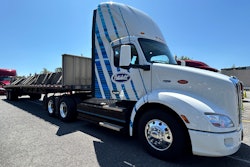NAL Worldwide LLC signed a definitive agreement to acquire the business assets of Sirva Logistics from North American Van Lines Inc. The Sirva Logistics business will be renamed NAL Worldwide LLC.
Estes Express Lines acquired 100 percent of Los Angeles-based carrier G.I. Trucking, expanding Estes’ U.S. service to 46 states coast-to-coast. Richmond, Va.-based Estes has shared ownership of G.I. since 2001, when the carrier and G.I. management together purchased G.I. from Arkansas Best Corp. For the past 10 years, Estes and G.I. have operated an LTL carrier network known as ExpressLINK.
North East Waste Services completed acquisitions of three New Jersey-based companies that specialize in the long-haul transportation and disposal of nonhazardous waste materials. The acquired businesses – PDC Disposal Co., David J. Martinez (DJM) Trucking and Pontie Disposal Co. – combined with North East Waste’s Somerset Hauling division represent more than 135 vehicles transporting more than 5,300 tons of waste daily.
Contract Freighters Inc. announced its “Northeast Bonus Pay” program, an additional 5-cents-per-mile bonus paid for miles dispatched in 12 qualifying states and the District of Columbia for all company drivers and leased trucks.
Carlile Transportation System, Anchorage, Alaska, is building a 60,000-square-foot terminal at the Port of Tacoma, Wash.
I recently bought a gas grill from a dealer who assembled it for me. The side burner didn’t work, so I called the dealer to get it fixed. To my chagrin, they gave me the manufacturer’s 800 number. When I buy something from a dealer, I expect them to service whatever they sell. Having to make several phone calls to fix a problem – especially one that wasn’t my fault – annoys me to no end. But I needed the grill fixed, so I called the 800 number.
Then a remarkable thing happened: I reached a person who actually helped me. At first, I didn’t make it easy on her – especially when she asked me for the serial number to a grill that was 20 miles away from the office where I was calling. When I expressed frustration, she calmed me down and told me a procedure to try and fix the problem myself, and then reminded me to get the serial number if that didn’t work. Guess what? Her advice worked, and I didn’t have to call back.
The experience didn’t make me a fan of the dealer, who should have tested the assembled grill. But it did make me a fan of the manufacturer: Thanks to that helpful person on the other end of my phone call, I doubt I will ever buy another grill from someone else.
That phone call also reminded me that what separates the great operations people from the mediocre is the ability to make the tough phone call to an irate customer or driver, or answer one from them. For customers, the two major sources of complaints are late shipments, or a lack of available trucks to pick up loads on time.
Carriers should call a shipper as soon as possible about a late pickup or delivery. Often, the early phone call will help the shipper minimize the impact of the service failure. Most shippers or receivers have enough flexibility in their operations that they can adjust schedules if they get advance warning. But when loads are running late, few want to make the call to the customer. There is always the desire to avoid a confrontation and hope somehow the problem simply will go away – or that someone else will pick up the phone when it rings.
Carriers should understand that when they initiate the phone call to tell a customer of a problem, they communicate to the customer that they are still in control of the situation. When the customer has to report a problem to the carrier, he thinks the operation is not under control. This is the important distinction in being proactive versus being reactive.
Often when a customer calls to report a problem, he is told that someone will get back to them. Sometimes operations really doesn’t have an immediate answer; other times they hope a manager or salesman will handle the angry customer. But telling a customer someone will get back to them often only adds fuel to the fire. It can become a raging inferno if no one gets back in a timely fashion, which happens all too often.
Drivers are no different. When they call in with a problem, they expect to have it solved. About the worse thing anyone can do is to tell drivers someone will get back to them, and then it never happens. So try to empower the people taking driver calls to fix the most common problems. The goal always should be to solve the driver’s problem on the first call: Doing so communicates that you are in control and the driver’s problems will be handled. And by not letting problems linger, dispatch doesn’t have to be on the defensive every time the driver calls.
Admittedly, drivers can be a tough group to handle. When I was in operations, I had several owner-operators call with regular complaints that I knew they were able to resolve themselves without calling. For some reason, they felt like bringing up the same old complaints again and again was the best way to stay in contact with me: It usually would take several minutes of conversation before the driver would bring up the real reason for calling. So it is always good to coach people that with drivers, not everything is what it appears to be initially.
FedEx Freight puts customers on notice
FedEx Freight announced plans to launch FedEx Freight Advance Notice, which will notify FedEx Freight customers via the Internet and fax if a shipment may be delayed beyond its estimated delivery date. This free communication will allow registered customers to make decisions and adjustments while a shipment is still en route, avoiding problems before they occur or minimizing impact to them and their customers.










